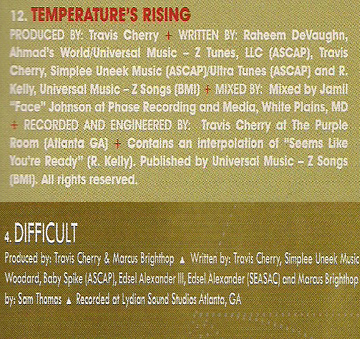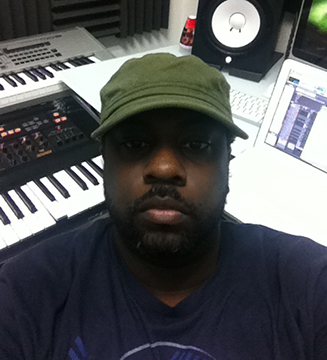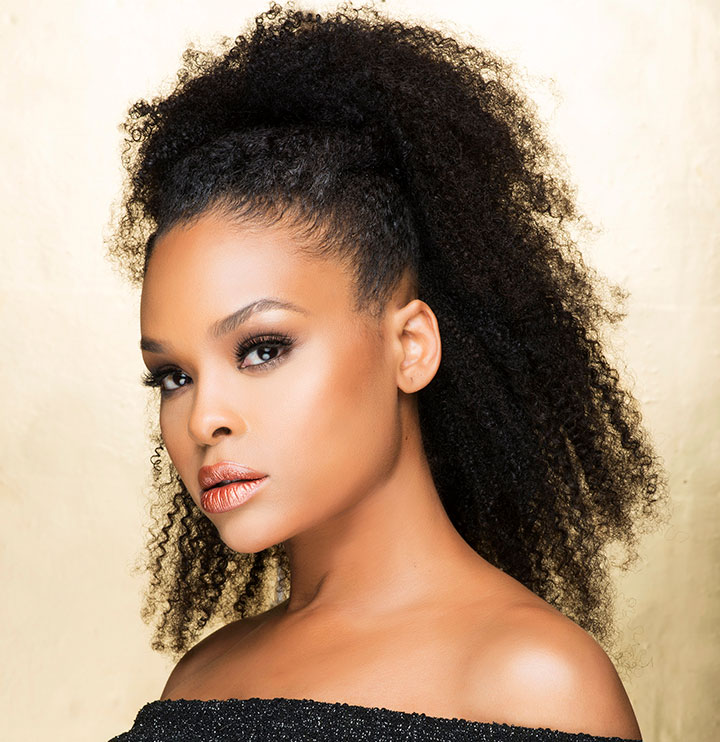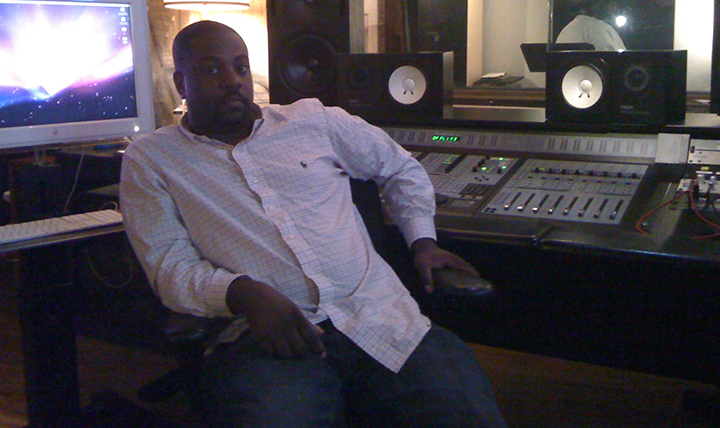Raleigh, NC native, music producer Travis Cherry is a hustler, navigating through the music business with a level of finesse that only those who have been around for a very long time can understand. However that spirit of hustle shouldn’t be confused with his career. When it comes to this music, he is more of skilled technician. He’s not a simple beat maker, but instead he’s a craftman, playing instruments, engineering in the studio, managing vocal production and taking every measure to satisfy the artist so that when you see his credit in an album booklet, you can rest assured that he put in work. A lengthy career in the business that has included a stint with the well known Platinum Brothers and two Grammy nominations, has led to this. 2015 is already looking like an amazing year with placements on two of the biggest R&B albums released so far this year, one of those being on the newly released Raheem DeVaughn single, “Temperatures Rising.” We talked to the man behind the boards for an depth conversation about what it’s like being the man behind the music.
Parlé Magazine: First, tell me about how you developed a passion for music.
Travis Cherry: Well for me, I guess it started growing up and hearing my mom sing and then quietly emulating her. I would hear her hum melodies and that was it for me.
Parlé: Coming up out of North Carolina, what was the music scene like growing up and are you happy with how far it has come?
Travis: It was ok. I liked the fact that there were a lot of pure singers floating around, especially with all the churches there. I think my earliest memory was hearing NC State radio and trying to record songs from there with my little boom box. I remember groups like Yaggfu Front and my homeboys Blak Regiment when I was in high school. You also had Lords of the Underground coming out of Shaw U. Music was something we grew up to. I’m glad to have lived during 1988 when it was so much Hip-Hop coming out and we embraced all of it in NC. From Public Enemy to NWA. I’m okay with how it has turned out. I think it could be better, but there’s some amazing talent coming. Some of my favorites are my boy Big Delph, Irak, King Fame, PWonda and I really like this record from Mike We$t and Hazardous Records called “You.” Cant forget my man Shyst. I think to really understand Raleigh you gotta understand our influence and our strength comes from the boom bap of New York. Most of the artists who still hold on to those elements tend to do well—like J. Cole.
Parlé: Quiet as kept, J. Cole isn’t the first artist to make it out of NC. But when it comes to everyone else, it seems they all related, is K-ci or somebody your second cousin? [The members of Jodeci are from North Carolina. Fantasia is also first cousins with K-ci & JoJo]
Travis: The only cousin I have that made it wasn’t in music. He was an actor. He’s one of the kids on the steps in New Jack City at the end right before they bust up and go get him.
Parlé: You’ve made a career as a producer but tell me about the early years as an artist?
Travis: Right before I graduated high school, I was training for track and tore the ligaments in my ankle. During that time I had a lot of time to think while it healed and I got with my friend Richard Petway and asked him about starting a group. I kinda sung in my bedroom during high school but my focus was on track. I always saw him in different groups in school and it kept calling me. He came back to me with two more guys and the rest was history. We had 2 different deals, one we didn’t sign and then the one that brought us to Atlanta and that was where I put down my roots in music.
Parlé: What was the name of that group?
Travis: Simplee Uneek was the name of the group.
Parlé: What was your height of success with those guys?
Travis: We almost got a deal with MJ through a radio personality in Raleigh but nothing ever happened.
Parlé: How’d the artistry end up as you being taken seriously as a producer?
Travis: Well, when my group broke up, I took my money and bought some basic equipment and stayed home trying to teach myself piano chords for a year and sampling every old record I could find. Then from there I got lucky one night in a grocery store and met a singer named Mozee who ended asking me to come to the studio where he was working. At the time I might have had 30 beats and they were all terrible but I was all about the hustle. The people he was signed to (DarkCity Records) asked me if could I engineer and I was like “um…yeah..,” knowing I was lying, but my mom always taught me that it doesn’t matter what job you go to or what the job is, even if you know how to do it, they always have to teach you their way of doing it. So that’s what happened. Po from Section 8 Mob signed me and they had me engineering/interning/producing/whatever needed to be done around the studio and I stayed there for almost 3 years. Best experience in the world. Funny too because he and his brother Fats always said they were gonna make sure that when I left them, I would be dope and it worked.
Parlé: When did you get your first “big break” in the industry and how?
Travis: When I got signed to The Platinum Brothers. I ended up working with an unknown but super dope artist named J. Holiday (“Come Here”) and at the same time Jennifer Lopez (“Gotta Be There”). Both records came out a week apart. Craziest thing to have happen as a still young producer getting a break.
Parlé: Talk to me about The Platinum Brothers. Anyone that listens to music for real has heard the name. How did you get involved and how long were you with them?
Travis: Umm they are two producers in Atlanta. They make great music. All I can really say at this time. I met one of them working at Guitar Center and I stayed in contact with them. Got with them at the end of 2004 and stayed until the beginning of 2009.
Parlé: What’s your creative process like? How do you come up with a beat?
Travis: Usually I play with melodies on piano and now some nights it’s me and my homie Marcus Brighthop at 3AM in the studio. He’s ignorant on guitar and he brings it with the creativity. You hear him on “Difficult” from Case’s new album.
Parlé: You studied medicine in school, first of all, what were your initial goals with that?
Travis: All my life I dreamed about being a veterinarian. I was always good with animals and I thought that that was the natural progression for me.
Parlé: Why’d you leave that behind?
Travis: Music. I was enjoying doing shows with my group and hearing us harmonize and watching people respond to it. Plus we moved to Atlanta after my 3rd year in college and I had to dropout.
Parlé: Who were some artists that inspired you?
Travis: Guy, Boyz II Men, The Temptations, The Police, Michael Jackson, Brian McKnight… pretty much every r and b song that came on BET Video Soul and made me dream that one day I could sit on that couch with Donnie Simpson…or be interesting enough to do an interview for Parle Magazine!
Parlé: What would you say is one of the biggest misconceptions about what you do and about producers in the industry in general?
Travis: I think people think we just sit all day and make music. I’ve had times where I may go 2 or 3 months when I have a beat block and all I can do is come to the studio and watch a movie or read a book. Now with this microwave generation, I think people think that anyone with a laptop is a producer and it’s not true. The real producers know how to make and work within a budget. If you are paying me 10k for a beat, I’m not going home with all of that. I’m paying writers, session players, there’s so much more to it. To call yourself a producer you are there from the moment the beat is created until the day it’s wrapped in plastic and sitting at wal-mart. You aren’t emailing or dropping a beat off. I’ve pushed engineers aside and worked the boards myself while vocal producing the session just to get the sound I want. You pay me, you are paying for a lot more than the track, and you deserve that. It’s your investment in your project. Anyone who doesn’t give you that commitment is just a beatmaker.
Parlé: You’ve worked on quite a few projects, Hip-Hop, R&B and Gospel, do you have a favorite type of track to produce? A favorite track you’ve produced or worked on?
Travis: I love doing all genres but there’s nothing like the soul of a great R and B record. I hear people say all the time that it’s dead but I can’t imagine you are listening to “Trap Queen” and getting a girl naked with candles on. You are turning on Marvin Gaye or Luther… or Raheem Devaughn and Case… maybe a little J Holiday (Laughs).

Parlé: So far this year you’ve worked with two artists we’ve featured, Raheem DeVaughn and Case. Let’s start with the Raheem track, it has the R. Kelly sample, how did “Temperatures Rising” come about?
Travis: Well, I had an idea one day to flip the R. Kelly song “Seems Like You’re Ready” and I watched a Youtube tutorial for 2 hours to learn how to play it. I started messing with these weird vocals in Sonik Synth while I did it, and the beat started coming together. A few months later, I hadn’t touched the track since then and I was playing beats for Raheem and he heard it and was like “Yo! He took that line “Temperatures Rising” and flipped the hell out of it.” Not even 3 hours later we had something we knew it was going to be timeless. I think we cut 2 songs that night and another the next night but we both knew it was special. I love his creativity and his attention to detail when he works. He has a crazy ear for what he wants on the production.
Parlé: When you do a track like that, which plays off of a classic song, do you have any concerns going into it?
Travis: Not really. I love sampling. And now more than ever I like ghosting a track. Like letting a sample play and then replaying certain elements then taking the sample out. You end up with some really crazy sounding stuff but it ends up being familiar to the listener.
Parlé: Moving on to the Case record, what was it like working with Case on “Difficult”?
Travis: Case is like a brother. We met in 2008 while I was still with The Platinum Brothers and he always said he would get me on his album, and damn if he didn’t come thru with his word. All around great dude to know, even if we didn’t ever do a record together. Always good for a laugh on Facebook or Instagram, same with Raheem. Cats that are still real and will actually answer a text at 3 a.m. when you have a music idea.
Parlé: There’s a multitude of writers and producers on the Case project, how did you get involved?
Travis: Through my man Wayne Washington who is over Case’s album. I’m always sending him new stuff I’m working on to his email. He was one of those people who told me to keep doing R and B. HE said wait until it come back around. You gon’ be that dude. And he was right.
Parlé: Last few years, let Wikipedia tell it, you’re only doing 2 tracks a year, but on a serious note, what you doing when you not appearing albums?
Travis: (Laughs) Well I’ve been in the studio working. I think after I left The Platinum Brothers in 2009, it took me 2 years or so to really tweak and change my sound. During that time, I was working with some great artists. Some still around like TK and Cash—and some not. The past 3 or 4 years have been a blur I guess. I got with some great partners and we opened our studio, The Purple Room, and from there I was working even more. I had a record called “Gold Mine” for D. Woods and we cut some more hot records that didn’t make it on her EP. I’ve been working with Slim from 112 on his sophomore solo project, but now he’s back with the group working on that album. I worked with a very special soul named Janeen Simone who is now in the group NLA and they just put out a hot single and video. I’ve been out to Vegas several times working with the big homie Mel Buckley. I took a group under my wing named Vincent Clark and we put out “Be My Girl” and now I’m working with a new singer named A Girl Named K. So I’ve been flying under the radar and baking the sound until it was ready to come out the oven. (Laughs) Also writing and updating my blog along with speaking to kids at different schools when I’m given the opportunity.
Parlé: You’ve made some magic with J. Holiday in the past, anything else coming from the two of you?
Travis: We were back in the studio together last fall. I gave him some heat. We cut like 2 joints so far. I think he wants to do something by the summer so I’m waiting to see what he’s written to the tracks he took home with him. We shall see. We definitely have magic though.
Parlé: Any other artists you’d like to work with?
Travis: Mary J. of course. If Destiny’s Child gets together again, I’d crush it with my harmony game. Umm… my new Woman Crush GOAPELE, yeah I would love to work with her. R Kelly. Jay Z… I can dream right? Boyz II Men would be fun. I’d even say Taylor Swift. Can you imagine?!
Parlé: Any upcoming projects your working on?
Travis: Already started ideas for Raheem’s 6th album and Case new album. Plus the phone is starting to ring so there’s some nice surprises coming. I don’t wanna jinx it.
Parlé: You’ve been working in the industry for 20+ years. What’s the biggest key to your longevity?
Travis: Just staying true to my sound. Not switching up and trying to fit a mold that’s not me. The greats have their own sound. You know it’s them when the song comes on. They don’t need a stupid ass tag at the front to announce it’s their tracks.
Parlé: What’s been the biggest challenge for you in the business?
Travis: Trying to stay true to my sound while other people are carbon copies of the last hit on the radio. Also navigating the urban A&Rs.

Parlé: I’m interested in hearing how competitive the production side of things is right now. Especially for R&B, which is coming back around but there’s still not that many opportunities.
Travis: It’s super competitive right now. So many people make one beat and call themselves a producer without earning it. They haven’t been through the downs of this business. They haven’t studied under other producers and engineers. They aren’t battle tested. It’s different when you’ve been told no for 5 years and keep tweaking your sound to finally get that placement versus making beats that sound like what ever is on the radio with the same sounds out of the same programs that everyone else is using. It’s even harder with R & B because just like a few years ago when there was the Hip-Hop is dead movement, everyone was screaming R & B is dead. But the funny thing is you see White artists making the music we SHOULD be making. Adele went diamond with an R & B album… Justin -R & B album. Amy Winehouse – Soul music. That’s why I respect Beyoncé. Work ethic is amazing and she sticks to that sound. I think R & B is back and the people like Wayne Washington, No ID and L Roc who told me to keep doing R & B were right. I’m glad to be one of its gatekeepers in this business moving forward and I’m going to keep bringing this North Carolina heat for the fans!
Parlé: What advice do you have for young producers and artists looking to make it in the industry?
Travis: Be what you are going to be. Don’t try to be another of what’s out there. It’s OK to be the next, but don’t be another. We don’t need another Beyoncé. Be the next Aretha. Compliment her space in the market. Kind of like the dope game. If everyone on this block is selling weed, sell heroin. I don’t advocate drug selling or usage, but that’s my analogy. Most of all study your craft. You got people who are “in” music who don’t even “like” music. Study an instrument. Practice until you hear the nuances in the strings of a guitar. Make love to it. Stop having one night stands. This isn’t a hustle, this is a career!
Be sure to follow Travis Cherry on social media:
Facebook
Twitter
Instagram
 [INTERVIEW] Demetria McKinney Lays It All Out On The Line In The Most Official Way
[INTERVIEW] Demetria McKinney Lays It All Out On The Line In The Most Official Way
Producer, Educator & Published Author, Tony Dofat Has An Unstoppable Hustle
[INTERVIEW] Producer & Songwriter Warryn Campbell – The Industry Heavyweight

